#centre for palestine studies
Text

An Oral History of the Palestinian, Edited by Nahla Abdo and Nur Masalha, Zed Books, London, 2018 [Institute for Palestine Studies]



Cover Design: Andrew Brash
#graphic design#history#historiography#book#cover#book cover#nahla abdo#nur masalha#centre for palestine studies#andrew brash#zed books#institute for palestine studies#2010s
54 notes
·
View notes
Text
"We have come together as Palestinian academics and staff of Gaza universities to affirm our existence, the existence of our colleagues and our students, and the insistence on our future, in the face of all current attempts to erase us.
The Israeli occupation forces have demolished our buildings but our universities live on. We reaffirm our collective determination to remain on our land and to resume teaching, study, and research in Gaza, at our own Palestinian universities, at the earliest opportunity.
We call upon our friends and colleagues around the world to resist the ongoing campaign of scholasticide in occupied Palestine, to work alongside us in rebuilding our demolished universities, and to refuse all plans seeking to bypass, erase, or weaken the integrity of our academic institutions. The future of our young people in Gaza depends upon us, and our ability to remain on our land in order to continue to serve the coming generations of our people.
We issue this call from beneath the bombs of the occupation forces across occupied Gaza, in the refugee camps of Rafah, and from the sites of temporary new exile in Egypt and other host countries. We are disseminating it as the Israeli occupation continues to wage its genocidal campaign against our people daily, in its attempt to eliminate every aspect of our collective and individual life.
Our families, colleagues, and students are being assassinated, while we have once again been rendered homeless, reliving the experiences of our parents and grandparents during the massacres and mass expulsions by Zionist armed forces in 1947 and 1948.
Our civic infrastructure – universities, schools, hospitals, libraries, museums and cultural centres – built by generations of our people, lies in ruins from this deliberate continuous Nakba. The deliberate targeting of our educational infrastructure is a blatant attempt to render Gaza uninhabitable and erode the intellectual and cultural fabric of our society. However, we refuse to allow such acts to extinguish the flame of knowledge and resilience that burns within us.
Allies of the Israeli occupation in the United States and United Kingdom are opening yet another scholasticide front through promoting alleged reconstruction schemes that seek to eliminate the possibility of independent Palestinian educational life in Gaza. We reject all such schemes and urge our colleagues to refuse any complicity in them. We also urge all universities and colleagues worldwide to coordinate any academic aid efforts directly with our universities.
We extend our heartfelt appreciation to the national and international institutions that have stood in solidarity with us, providing support and assistance during these challenging times. However, we stress the importance of coordinating these efforts to effectively reopen Palestinian universities in Gaza.
We emphasise the urgent need to reoperate Gaza’s education institutions, not merely to support current students, but to ensure the long-term resilience and sustainability of our higher education system. Education is not just a means of imparting knowledge; it is a vital pillar of our existence and a beacon of hope for the Palestinian people.
Accordingly, it is essential to formulate a long-term strategy for rehabilitating the infrastructure and rebuilding the entire facilities of the universities. However, such endeavours require considerable time and substantial funding, posing a risk to the ability of academic institutions to sustain operations, potentially leading to the loss of staff, students, and the capacity to reoperate.
Given the current circumstances, it is imperative to swiftly transition to online teaching to mitigate the disruption caused by the destruction of physical infrastructure. This transition necessitates comprehensive support to cover operational costs, including the salaries of academic staff.
Student fees, the main source of income for universities, have collapsed since the start of the genocide. The lack of income has left staff without salaries, pushing many of them to search for external opportunities.
Beyond striking at the livelihoods of university faculty and staff, this financial strain caused by the deliberate campaign of scholasticide poses an existential threat to the future of the universities themselves.
Thus, urgent measures must be taken to address the financial crisis now faced by academic institutions, to ensure their very survival. We call upon all concerned parties to immediately coordinate their efforts in support of this critical objective.
The rebuilding of Gaza’s academic institutions is not just a matter of education; it is a testament to our resilience, determination, and unwavering commitment to securing a future for generations to come.
The fate of higher education in Gaza belongs to the universities in Gaza, their faculty, staff, and students and to the Palestinian people as a whole. We appreciate the efforts of peoples and citizens around the world to bring an end to this ongoing genocide.
We call upon our colleagues in the homeland and internationally to support our steadfast attempts to defend and preserve our universities for the sake of the future of our people, and our ability to remain on our Palestinian land in Gaza. We built these universities from tents. And from tents, with the support of our friends, we will rebuild them once again."
814 notes
·
View notes
Text
celebrating palestinian science
in the face of israels' targetting of scholars, scientists and intellectuals...
saw a tumblr post by @/anarchistfrogposting that got me heavythinking about the relevance of language and culture in chemistry and science, it's unfortunate english has been accepted as its' lingua franca and most other input is lost to the globalization of this change. formulae and structure are essential and in a subject so specific, the average chemist will need to memorize hundreds of chemistry-specific words, and it becomes a barrier past entry when direct translating gets murky. deconstructing the history of science will always lead to political waters as the politicization of science and populist anti-intellectualism ethos rooted itself since the beginning of the study and these implicit biases result in a lack of consensus amongst borders.
before wwi the geographical spread of language in science was much more diverse, a lot of french and german researchers were common in research publishing, but after the allies established new scientific institutions that excluded germans and the isolationist decades that followed suit, foreign-language education was reductionist and excised globally as a result of elitism, being a language considered spoken only 'by the educated'. english-language proficiency is undeniably a prerequisite when an inexaggerated count of 99% of natural science papers are published in english, starting since 2015. this is a /heavily/ debated and discoursed topic and is terribly intimidating to sink your teeth into because of globalization of english and the complexity of modern language but getting over this hurdle will blossom a culturally rich rabbit hole to go down and it is all super interesting. there is so much great palestinian scientific practices, not as in western scientists work imagined in palestinian hands, but palestinian-born theories and practices. i think it's really integral, to always, but especially during times like these to uplift the people of palestine and their beauty just as much as funnel hatred toward their oppressors and murderers.

==
[image ID: a lineup of various glass pots and vases, ranging in color and size, placed in front of a plain background. end]
this is a specific sort of glass called 'hebron glass' which is an extremely renowned palestinian practice and passed down traditionally through multiple families and businesses. dating back as far as the 100~s in BCE, their technique of glassblowing was far ahead of their time and not used commonly anywhere else until much further in BCE. the /exact/ practice of hebron glass is kept a family secret amongst palestinian businesses, but a metal tool called 'kammasha' is used to blow the glass. a palestinian artisan talks about the process in more length here, i would recommend doing extended reading directly from palestine:
the colors are so vibrant and beautiful, i am endlessly impressed by how elegant these pieces have been made since the middle ages. these pieces and techniques have inspired a lot of famous modern day forms of glassblowing and glass artistry, most notably the venetian glass of venice.
i include this under science as much as it is art because it often goes unseen how much temperature and calculation goes into this craft. its highly skilled and intense work to bend over the hot flames and handle the glass in such a vulnerable state that could easily shatter. the material is more than 1800F and the palestinian kammasha is very carefully timed.
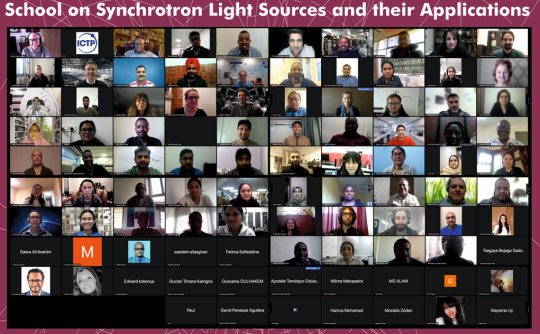
==
[image ID: an online video call meeting titled 'School on Synchrotron Light Sources and their Applications' at the top. end]
what you're looking at right now is the SESAME initiative run by the international centre for theoretical physics. a famous alumnus of this school was sufyan tayeh, a palestinian scientist. he was a prominent researcher and mentor and advocate for international understanding through science, introducing: SESAME, an alternative vision for the future of peaceful coexistence and cooperation and offered a meeting point around the globe to speak the common language of science, making communication possible. sufyan tayeh was an inspiration and bridge builder for all of these young students and an entry point for future scientists. he was a winner of multiple awards for his contributions to science and was appointed chair man for UNESCO (united nations educational, scientific and cultural organization) and head of physical, astrophysical and space sciences in palestine. he was regarded as a leading researched in science and applied mathematics globally, and tragically was killed in the current genocide. this is one case of many, many palestinian researchers. the impact of their contributions are insurmountable and irreplaceable.
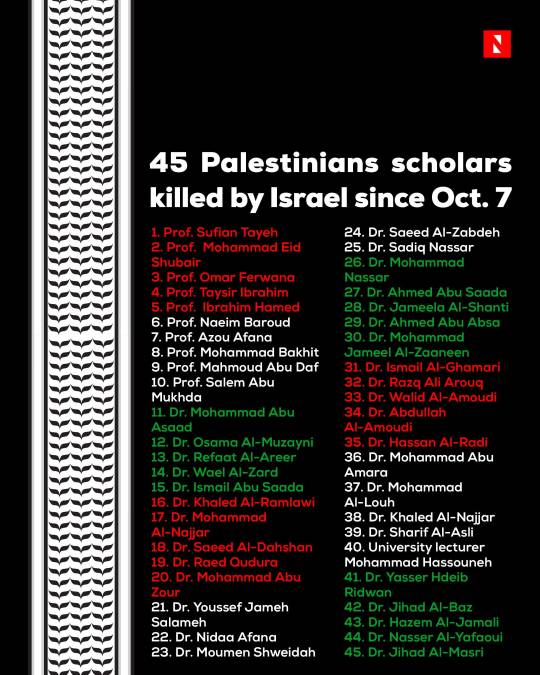
==
[image ID: a list documenting the 45 palestinian scholars killed by israel since october 7th: Sufian Tayeh, Mohammad Eid Shubair, Omar Ferwana, Taysir Ibrahim, Ibrahim Hamed, Naeim Baroud, Azou Afana, Mohammad Bakhit, Mahmoud Abu Daf, Salem Abu Mukhda, Mohammad Abu Asaad, Osama Al-Muzayni, Refaat Al-Areer, Wael Al-Zard, Ismail Abu Saada, Khaled Al-Ramlawi, Mohammad Al-Najjar, Saeed Al-Dahshan, Raed Qudura, Mohammad Abu Zour, Yousseff Jameh Salameh, Nidaa Afana, Moumen Shweidah, Saeed Al-Zabdeh, Saqid Nasaar, Ahmed Abu Saada, Mohammad Jameel Al-Zaaneen, Ismail Al-Ghamari, Razq Ali Arouq, Walid Al-Amoudi, Abdullah Al-Amoudi, Hassan Al-Radi, Mohammand Abu Amara, Mohammad Al-Louh, Khaled Al-Najjar, Sharif Al-Asli, Mohammad Hassouneh, Yassar Hdeib Ridwan, Jihad Al-Baz, Hazem Al-Jamali, Nasser Al-Yafaoui, and Jihad Al-Masri. end]
==
the fabric gauze was also invented in palestine. if you've ever stepped foot in a labratory, you will know what this is lol. used in surgery and in chemical labs for multiple functions: separating liquids and gases, strain acids from bases, filter substances at extreme temperatures, prevent contamination, and to treat water. it is also used to diffuse heat and help protect glassware, seriously, these guys influence in glassware was HUGE. i think glass would still be sand without palestinian input.
i've set this post just up as a basis summary of the sciences, i would love to give an add-on going more indepth into the scientific process of some examples i gave and also in the history of palestinian scholars listed above.. when i get the time! but i hope this was an apt introduction! may good things come in 2024. feel free to recommend things i should check out or correct. OH OH also there is a lot of palestinian sci-fi.. 'divine intervention' and 'the second war of the dog' are both good, iirc they won the international prize for arabic fiction. just random things i found while looking up things for this post haha but they're good
536 notes
·
View notes
Text
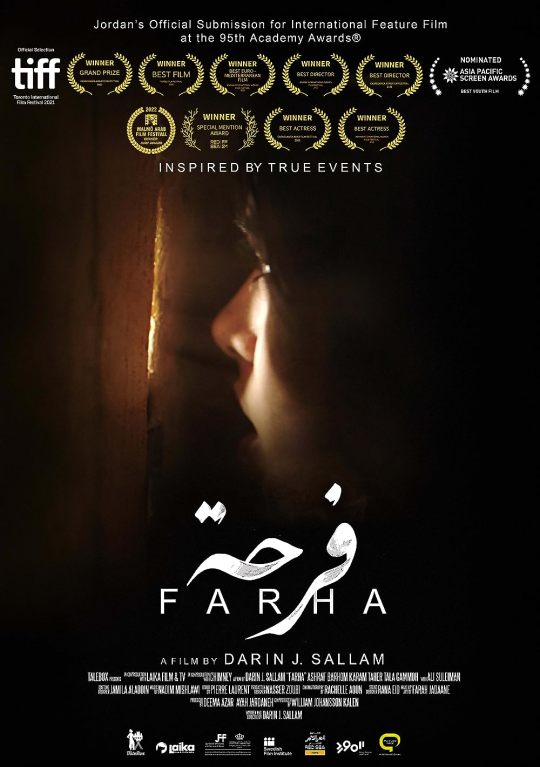


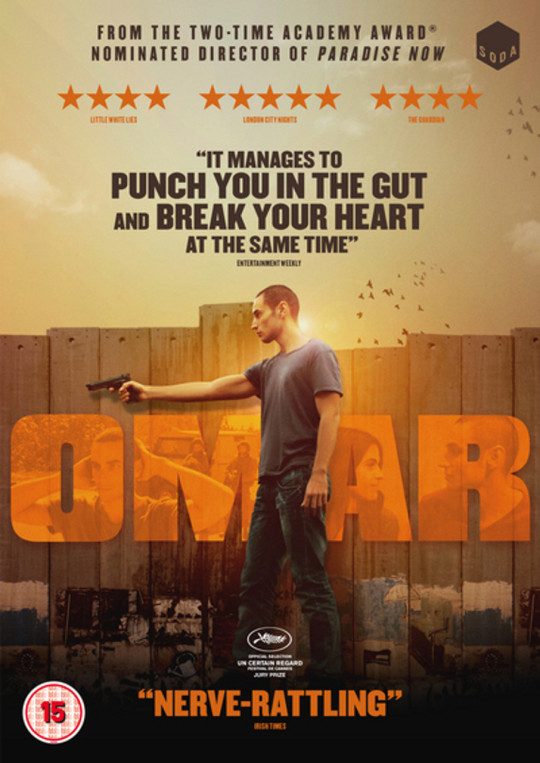
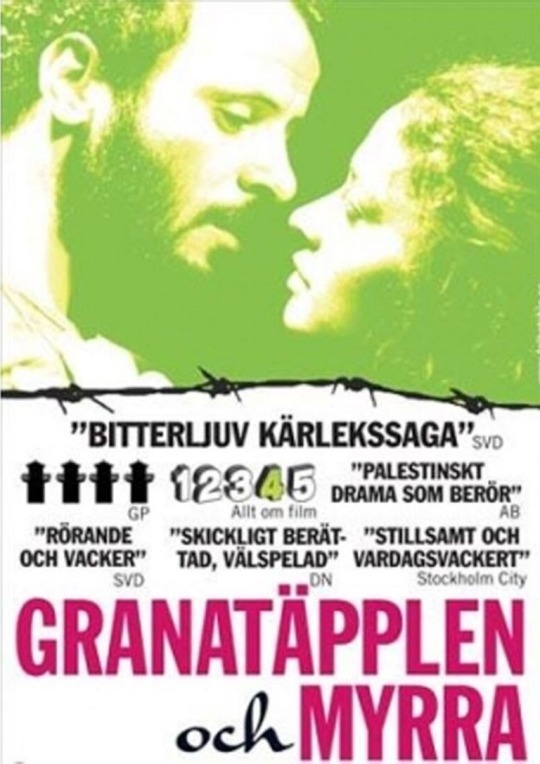


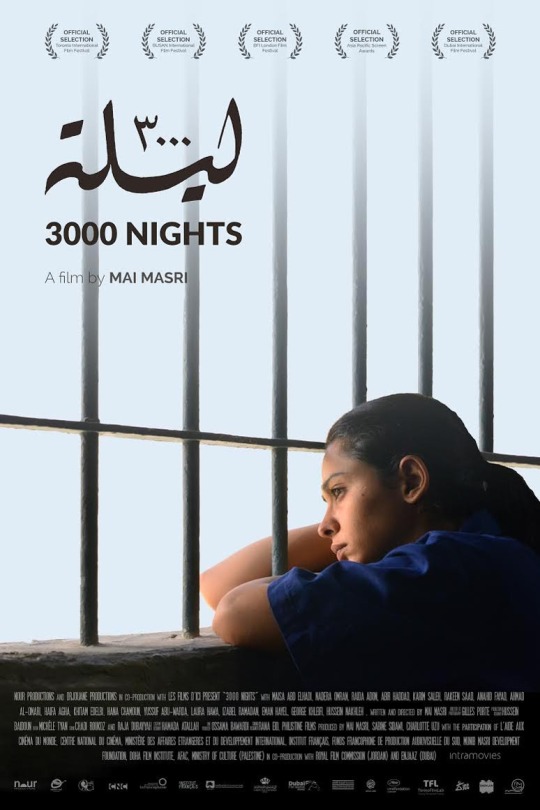


10 films on Palestine that everyone should watch
Explore the tales of Palestinians who have suffered atrocities at the hands of Israeli occupation forces for 75 long years.
ith the Gaza invasion dominating headlines around the world and Israel carpet bombing the Gaza strip, killing scores of civilians, we have complied a list of films that highlight the plight of Palestinians so that people remember the human stories behind the statistics.
United Nations Secretary-General Antonio Guterres, in a Security Council meeting held on October 24 to discuss the Middle East situation, asserted, “It is important to also recognise the attacks by Hamas did not happen in a vacuum. The Palestinian people have been subjected to 56 years of suffocating occupation. They have seen their land steadily devoured by settlements and plagued by violence; their economy stifled; their people displaced and their homes demolished.”
His powerful statement rings true as Palestinians have been suffering under the apartheid rule of Israel for far too long. Palestinian people have tried various ways to raise their voices and tell the world about Israel’s atrocities, which have been ongoing since the Nakba in 1948. One of the most successful methods has been telling real stories through films, dramas, and documentaries.
Here are 10 films that depict how the people of Palestine have suffered for the past 75 years.
Farha (2021)
The film depicts the true story of a Palestinian girl who survived the Nakba of 1948, when thousands of Palestinians were expelled from their homeland. The hopeful young girl who wanted to study in the city watched silently from the pantry of her house while Israeli forces ethnically cleansed her neighbours and other fellow countrymen slaughtered by them.
The movie, directed by Hassiba Freiha and Kenton Oxley, is available on Netflix.
Tale of the Three Jewels (1995)
Set in contemporary Gaza, the movie is the story of a Palestinian boy, Yusef, who becomes entranced with a beautiful Gypsy girl. The children explore nature, mysticism, and their future while learning to live amid the surrounding brutality. To escape, Yusef sets off on a journey to the North American dreamworld with his blind neighbour.
Directed by Michel Khleifi, the movie is available to watch online on various sites.
Children of Shatalia (1998)
Farah, age 11, and Issa, age 12, are two streetwise children living in Beirut’s Palestinian Shatila refugee camp, located in the city’s “belt of misery.” The centre is home to 15,000 Palestinians and Lebanese who share a common experience of displacement, unemployment, and poverty. The two children are given video cameras; they use their imaginations and creativity to come to terms with the realities of growing up in a refugee camp that has survived massacre, siege, and starvation.
Directed by Mai Masri, the movie is available on Netflix.
Omar (2013)
Omar is a young Palestinian man living in Israeli-occupied West Bank where he must navigate a steep separation wall and checkpoints to visit his friends. Omar sees his horizons diminish after he carries out a sniper attack with his two childhood buddies. He’s captured, imprisoned, tortured, and coerced into becoming an informer for the Israelis but finds he’s not the only traitor.
Directed by Hany Abu-Assad, the second film from the Palestinian territories to be nominated for an Academy Award is available on Netflix.
Pomegranates and Myrrh (2009)
The film tells the story of a Palestinian woman who uses Dabke (a traditional folk dance) to cope with the loss of her husband, who is taken away by Israeli authorities. The story talks about the political climate of Palestine and the internal and external sufferings of Palestinians.
Directed by Najwa Najjar, the movie is available on Netflix.
Eyes of a Thief (2014)
The film’s central plot-line is a father’s search for his daughter. As he searches, he not only has to fight against the lack of freedom under occupation but also against social boundaries. Having served a 10-year prison sentence for an attack on Israeli border soldiers, Tarek sets out to find his daughter Malak. When he eventually finds her in Nablus, however, he discovers that she has been adopted. He can’t reveal himself publicly as her father, so he takes a job nearby working as an engineer for the official in charge of water at the Palestinian National Authority to be able to approach her in secret.
Directed by Najwa Najjar, the film is available on Netflix.
The Time That Remains (2009)
This semi-autobiographical film tells the story of a father who fought in the 1948 war and chose to stay back when Israelis took over. It depicts the life of Palestinians living as a minority on their own land. The film is divided into four parts.
Directed by Elia Suleiman, The Time That Remains is available for streaming on Apple TV.
3000 Nights (2015)
The film illustrates the plight of political prisoners in Israel. Set in 1980, Nablus, 3000 Nights follows a newly-married school teacher, Layal, whose crime is giving a ride to a teenage boy who is accused of executing a lethal attack on a military checkpoint. Layal is sentenced to eight years in prison, where she spends her pregnancy and gives birth to a boy.
Directed by Mai Masri, the film is available on Netflix.
The Present (2020)
A father-daughter duo living along the Palestine border sets out to buy a fridge. The pair has to cross the checkpoint, segregated road, and armed soldiers, which involves a stringent checking process to cross the border. The movie depicts the life of Palestinians who can’t do basic daily routine things without facing harassment by IDF soldiers.
Co-written and directed by Farah Nabulsi, the BAFTA Award-winning film is available on Netflix.
When I Saw You (2012)
This story focuses on the heartache of a young boy, Tarek, who wants his father and his state back. He is displaced in a grim camp, with no one to turn to, and proceeds on a journey to turn his life around.
Directed by Annemarie Jacir, the movie is available on Netflix.
If you are interested in the historical context of the Israel-Palestine conflict, take a look at this list compiled by Al-Jazeera.
As Israeli forces bomb Gaza relentlessly to ‘punish’ Hamas, killing thousands of innocent Palestinians, it is important to remember their stories.
Words courtesy of images.dawn.com
#human rights#art#humanity#equal rights#freedom#women's rights#freedom for palestine#freegaza#freepalestine#movies#when i saw you#netflix#farah nabulsi#bafta#hamas attack#the present#gaza strip#free gaza#3000 nights#the time that remains#myrrh#pomegranate#omer#omar#childrens of shatila#farha#united nations#peace#al-jazeera#image.dawn.com
106 notes
·
View notes
Text
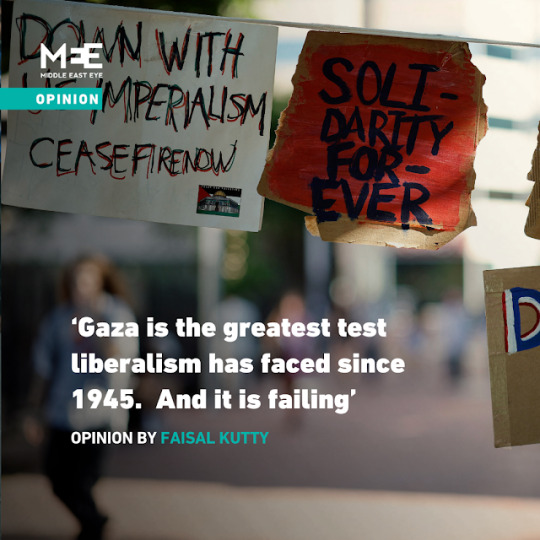
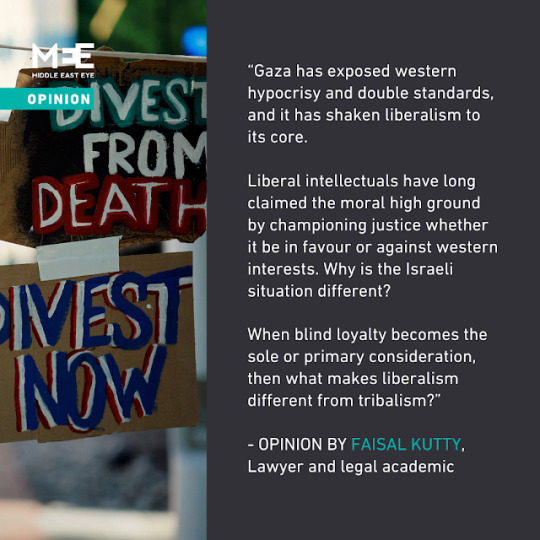
"Last month, EU foreign policy chief Josep Borrell called Gaza 'a graveyard for tens of thousands of people and also a graveyard for many of the most important principles of humanitarian law'. The reality may be even worse.
I fear it may become the graveyard of liberalism itself. Three decades ago, liberalism was the lead chariot in the procession of the liberal democratic project.
New democracies were emerging in Europe; the Soviet Union had crumbled, and Russia was in transition; the Berlin Wall had fallen; and South Africa's apartheid regime was collapsing.
Even China exhibited signs of change. Liberal democracy appeared invincible, both in practice and in theory.
There appeared to be no real competition as it stood out as a triumphant and principled form of governance. Ask any well-versed liberal arts student and they will recite that liberalism is a political and philosophical ideology centred on the principles of individual liberty, equality and limited government.
They will point out that it emphasises the protection of individual rights and freedoms, including freedom of speech, religion and assembly, as well as the rule of law and democratic governance.
While advocating for a market-based economy with private property rights, free trade and minimal government regulation, liberalism also promotes social welfare programmes to alleviate disadvantages and ensure equal opportunities for all citizens.
Additionally, liberalism supports the idea of pluralism, tolerance and diversity, aiming to create societies where individuals can pursue their own interests and live according to their own beliefs without undue interference from the state.
The essence of liberalism lies in its commitment to the rule of law and human rights. Sounds amazing, so what’s the problem, you may be asking? Those observing the “plausible genocide” without a propaganda lens over the last six months have had front-row seats on a systematic erosion of liberal values and ideals.
Gaza has exposed western hypocrisy and double standards, and it has shaken liberalism to its core. Both domestic and international commitment to the rule of law, human rights and a rules-based order are being undermined by, arguably, the most powerful lobby in the world. Pro-Israeli lobbies have hijacked most western liberal democracies.
The whole world is now privy to the shameless pimping of western politicians previously documented in Congressman Paul Findley's 1985 book They Dare to Speak Out and reinforced by the 2007 book The Israel Lobby and US Foreign Policy, by political scientists John Mearsheimer and Stephen Walt.
As an anonymous commentator wrote: “People think Gaza is occupied, but in reality, Gaza is free but the whole world is occupied.” Liberal elites and leaders who joined millions in support of free speech and proclaimed “Je suis Charlie” in solidarity with the French satirical newspaper Charlie Hebdo after terrorists killed 12 people at its Paris offices in 2015 to try to shut it down, are now calling for suppression of free speech. By a vote of 377-44-1, the US House passed a resolution that the "slogan, 'from the river to the sea, Palestine will be free' is antisemitic and its use must be condemned".
Of course, the statement is not threatening or condemnable if you substitute “Palestine'' with “Israel”, as you see being done by many Israeli supporters and in the Likud manifesto.
The University of Southern California, in an unprecedented move, cancelled its Muslim valedictorian, Asna Tabassum, who minored in genocide studies, from delivering her address because of alleged threats from pro-Israeli groups.
They cited unspecified “security concerns”. I thought the idea was to never give in to what are clearly “terrorist” demands. To make matters worse, due to the fallout, in another unprecedented move, the university subsequently cancelled all other speakers and honorary doctorate presentations during convocation. Where are the “Je suis Asna” calls from liberal elites and institutions? Hundreds of students and faculty at Columbia, Yale and New York University have been arrested peacefully (in the words of the police chief) protesting against the killings by Israel.
Another 200 mostly Jewish protesters were arrested in front of Senate majority leader Chuck Schumer’s Brooklyn residence, where they gathered for the seder, a ritual that marks the second night of the Passover holiday celebrated as a festival of freedom by Jews worldwide. No free speech mobilisation by liberal elites anywhere to be seen.
Those who championed freedom of expression are now banning the keffiyeh, the traditional Palestinian headdress, because it is making some people uncomfortable.
Last week, the Ontario legislature banned the headdress, forcing a scheduled meeting between legislators and pro-Palestinian protesters to be held outside the legislative buildings because the activists had donned their keffiyehs. Israeli military dog tags, Israeli flags and other political symbols, of course, are not political in the same way.
The situation is no different in many European countries. Who thought that liberalism was so fragile and malleable by those who seek to subvert it for their own illiberal goals, namely promoting ethnic cleansing by the ethno-nationalist and racist state of Israel.
In the wake of the mass killings of the Second World War and the Holocaust, the new liberal world order enacted human rights treaties and enacted humanitarian laws to make sure that such massacres and abuses were "never again" repeated. Rising out of the horrors of the Second World War we saw the establishment of the United Nations and the drafting of the international bill of human rights that would obligate "every state to recognise the equal right of every individual on its territory to life, liberty and property, religious freedom and the use of his own language".
The bill consisted of the Universal Declaration of Human Rights, the International Covenant on Civil and Political Rights and the International Covenant on Economic, Social and Cultural Rights. We also saw the enactment of the Geneva Conventions of 1949, which sought to improve the legal protection of non-combatants, medical personnel, medical facilities and equipment, and wounded and sick civilians.
Despite these advances claimed by liberals, today we are witnessing war crimes, crimes against humanity and “plausible genocide”, according to the International Court of Justice, being live-streamed to our devices.
If liberalism cannot offer a moral and ethical form of governance, then what good is it? What are the grandiose declarations, pronouncements and treaties good for? In the midst of such an unprecedented attack on a corralled civilian population by a western colonial implant and ally, if liberalism shows no will, ability or desire to protect civilian life, regional security, a nation's own national interests and global order, then its mission-defining claims of principle and competence collapse.
Liberal intellectuals have long claimed the moral high ground by championing justice whether it be in favour or against western interests. Why is the Israeli situation different? When blind loyalty becomes the sole or primary consideration, then what makes liberalism different from tribalism? When global security and safety can be sacrificed at the altar of friendship and similarity, then what becomes of the West’s claim to authority as a political and military custodian of a rules-based international order? Might and dominance can be mistaken for right, but let's not forget that dissenting minorities, the oppressed and colonised may conclude that their only choice is to resist by any means necessary, and revolution is always a higher likelihood.
Even domestically, history has proven that societies that combine responsiveness to the will of their people with robust protections for individuals and minority groups are in the best position to strike a flexible and sustainable balance among these competing forces. We can only hope and pray (sorry are we still allowed to do that?) that this is some sort of glitch or malfunction, and liberal elites and intellectuals will wake up from their slumber and remind liberal politicians that the very raison d’etre of the liberal democratic project is under threat of collapse. It is almost too late, but there may be a sliver of hope.
How liberal elites respond to the Gaza challenge and salvage whatever shreds of credibility remain will dictate the legacy of liberalism.
Liberals must stand up for their principles or forever hang their heads in shame. ✍️ Faisal Kutty
#free Palestine#free gaza#I stand with Palestine#Gaza#Palestine#Gazaunderattack#Palestinian Genocide#Gaza Genocide#end the occupation#Israel is an illegal occupier#Israel is committing genocide#Israel is committing war crimes#Israel is a terrorist state#Israel is a war criminal#Israel is an apartheid state#Israel is evil#Israeli war crimes#Israeli terrorism#IOF Terrorism#Israel kills babies#Israel kills children#Israel kills innocents#Israel is a murder state#Israeli Terrorists#Israeli war criminals#Boycott Israel#Israel kills journalists#Israel kills kids#Israel murders innocents#Israel murders children
20 notes
·
View notes
Text
Shabbat shalom, here is my rabbi's thought of the week destined to every Jewish student out there suffering from the increased antisemitism in campus.
A Letter to Jewish Students at Universities and Colleges
16 February 2024
Dear Students,
I don’t know if this letter will reach you. Maybe your parents or grandparents will send it on to you, or someone will post it on social media. You might glance at it briefly and see that it is expressly addressed to you, wherever you happen to be. A letter long overdue, but necessary at a time of unprecedented and painful polarisation and turbulence on campus at universities and colleges.
I have spoken to some of you face to face or on Zoom over the past few months since October 7. I know that this is a desperately harrowing and bewildering time, and many of you are searching for companionship and someone to talk to, not only about what is happening in this war between Israel and Hamas, but what is taking place here in the UK – this terrific spike in thoughtless, ignorant and hurtful anti-Jewish incidents and words.
I don’t know how affected you are by the reverberations of the conflict in the Middle East. Your focus may be on your studies, on the daily assignments that must be in by certain deadlines. You may have your own personal preoccupations with family or relationships, with other worldly concerns such as what we are doing to the environment, or the growing gap between rich and poor.
But I am deeply struck by the reports I have heard and read about concerning what is happening at universities – in the lecture theatre, on campus and on social media, in particular.
What does it feel like for someone Jewish to walk past a group of demonstrators holding banners with the words ‘Zionists off our campus’ or ’Stop the Genocide against Palestine’? How do you react when you hear the words of protesters shouting, ‘From the river to the sea, Palestine will be free’? How does it feel when close friends suddenly start to question your loyalties and to blame you for the war in Gaza? How do you respond to the accusation that the bombing of Gaza is the expression of Western imperialism by Jews?
Perhaps you are keeping a low profile, tucking your Magen David underneath your clothes, refusing to share with fellow students or friends your Jewish identity. You may be nervous about ‘coming out’ as Jewish with the huge increase of anti-Jewish incidents on campus and on the streets. And this is understandable – it may be too scary to confront the slogans carried and proclaimed by protesters week after week through city centres.
I wonder if you are someone who wants to – or needs to – speak to friends and fellow students about family or friends in Israel and the terrible trauma of October 7? And why shouldn’t you? A first-year student at [...], a member of the [this shul], said that she was labelled a ‘brainwashed Zionist’ by fellow classmates after she had spoken about friends who had narrowly escaped from the music festival in Israel. The language used against her on social media was so full of hatred that it drove her out of her classes.
Such conduct is unspeakable, as are the death and rape threats against the Jewish chaplain and his wife in [city] who have been forced to go into hiding with their two very young children.
Where is civility? Where is kindness? Where is understanding and intelligent listening and conversation? Where is humility and empathy?
It is a long time since I was at university. Being Jewish wasn’t always comfortable. Students who had never encountered a Jewish person brought their curiosity, but also their prejudices about Judaism, about Jewish history and identity. Few people spoke about the Shoah thirty years after the liberation of Auschwitz. Few books had been published, compared with the plethora on the subject today. There were none of the scores of films and documentaries that emerged in the late nineties and in the years that followed. History stopped with the Russian Revolution.
We have learnt so much more and know so much more. So why are we still so ignorant about each other? Why can’t we learn from history?
We don’t have the answers to the intractable conflict in the Middle East. But we do know that the only way forward is for Israelis and Palestinians to be helped towards a peaceful solution – through political and not military means. We can model that conversation with those out in the streets or on campus by helping them learn something about what it means to be Jewish in today’s world. It takes courage, but done gently and patiently, we can engage in those challenging relationships.
I wish you success in your studies and strength as we navigate this difficult time together.
Shabbat Shalom,
Rabbi [...]
#israel#judaism#jewish#jumblr#frumblr#this is the tag for my text posts#i was worried about posting this and being harassed on the internet and this be used against me but#well#you know
26 notes
·
View notes
Text

“We have assembled once again as South Africans, our Palestinian guests and as humanists to express our solidarity with the people of Palestine.
I wish to take this opportunity to congratulate the organisers of the event, particularly the United Nations Information Centre and the UNISA Centre for Arabic and Islamic Studies for this magnificent act of compassion, to keep the flames of solidarity, justice and freedom burning.
The temptation in our situation is to speak in muffled tones about an issue such as the right of the people of Palestine to a state of their own. We can easily be enticed to read reconciliation and fairness as meaning parity between justice and injustice. Having achieved our own freedom, we can fall into the trap of washing our hands of difficulties that others faces.
Yet we would be less than human if we did so.
It behoves all South Africans, themselves erstwhile beneficiaries of generous international support, to stand up and be counted among those contributing actively to the cause of freedom and justice.
Even during the days of negotiations, our own experience taught us that the pursuit of human fraternity and equality - irrespective of race or religion - should stand at the centre of our peaceful endeavours. The choice is not between freedom and justice, on the one hand, and their opposite, on the other. Peace and prosperity; tranquillity and security are only possible if these are enjoyed by all without discrimination.
It is in this spirit that I have come to join you today to add our own voice to the universal call for Palestinian self-determination and statehood.”
~ Nelson Mandela on December 4, 1997 during his address at International Day of Solidarity with Palestinian People
#our world#black lives matter#let gaza free you#our history is your history#nelson mandela#antiracist liberation#free palestine#free south africa#end apartheid
23 notes
·
View notes
Text
Seventy-one per cent of Gaza’s population experiences extreme hunger, Euro-Med Monitor study says
Over 71% of participants in a study conducted in the Gaza Strip by Euro-Med Human Rights Monitor said that they suffer from extreme hunger, corroborating accusations that Israel uses starvation to punish Palestinian civilians.
Euro-Med Monitor conducted an analytical study that included a sample of 1,200 people in the Gaza Strip in order to ascertain the impact of the humanitarian crisis that Gazans are experiencing in the midst of Israel’s ongoing Israeli genocidal war, which began on 7 October.
According to the study’s findings, 98% of respondents said they eat insufficient amounts of food, while 64% of the participants admitted to eating grass, fruits, immature food, and expired materials to satiate their hunger.
The study found that the rate of access to water in the Gaza Strip, including drinking, bathing, and cleaning water, is 1.5 litres per person per day. This is 15 liters less than the minimum amount of water required for survival at the level required by international standards, noted Euro-Med Monitor.
Additionally, the study examined the effects of malnutrition and a lack of access to clean drinking water. Sixty-six per cent of the study sample reported having experienced diarrhea, skin rashes, or intestinal diseases in the past month.
Euro-Med Monitor transcribed testimonies from doctors revealing an increase in the rate of deaths from fainting and heart attacks in the areas of Gaza City and the Strip’s northern sections, which are witnessing a more severe deterioration in the humanitarian crisis and hunger rates.
Since the start of its genocide in Gaza, Israel has imposed a comprehensive blockade on the Strip and prevented supplies of food, water, fuel, and other humanitarian necessities from reaching the more than 2.3 million residents of the Strip. Israel’s use of starvation as a weapon has taken intensified since 7 October, and has included cutting off all food supplies to Gazans as well as bombing and destroying the Strip’s bakeries, factories, food stores, and water stations and tanks.
Israel has also targeted solar energy systems and electrical generators that power restaurants, businesses, and government agencies. Additional Israeli attacks have destroyed the agricultural area east of Gaza; flour stores; fishing boats; and supply centres for relief organisations, especially the United Nations Relief and Works Agency for Palestine Refugees (UNRWA), the largest source of humanitarian aid in the Strip.
Under international pressure, Israel opened the Rafah land crossing; however, the crossing is open to an average of just 100 trucks per day, for humanitarian supplies coming from Egypt. This is a far cry from the average load of 500 trucks that entered the Strip prior to 7 October to meet humanitarian needs. It is important to note that roughly half of the Gaza Strip’s population is children under the age of 18.
Although a limited amount of food aid has been allowed to enter the enclave, no commercial food imports have been delivered, leaving the Gaza Strip’s residents in dire need of food, particularly in light of the Israeli collective punishment policy.
Euro-Med Human Rights Monitor stressed that international humanitarian law strictly prohibits the use of starvation as a weapon. As an occupying power, Israel is obligated under international humanitarian law to provide basic needs and protection to the Gazan people.
The Rome Statute of the International Criminal Court provides that intentionally starving civilians by “depriving them of objects indispensable to their survival, including willfully impeding relief supplies” is a war crime, said the Geneva-based rights group. Euro-Med Monitor called for decisive international action to impose a permanent ceasefire in the Gaza Strip and prevent further deterioration of the situation by providing fair and unrestricted access to basic and relief materials to the entire Strip, and allowing the entry of food, water, medical, and fuel supplies in order to meet the needs of the population.
#from the river to the sea palestine will be free#free palestine#palestine#gaza#im sorry to share euromed monitor but this is important#never forget
15 notes
·
View notes
Text
The Zionist project is coming to an end, with Ilan Pappé
youtube
We are joined by Ilan Pappé, professor of history at the University of Exeter in the UK and director of the European Centre for Palestine Studies.
Pappé gained renown as one of the “new historians,” a group of Israeli scholars who in the 1980s shattered longstanding Zionist lies about the founding of Israel, and corroborated Palestinian accounts of the Nakba using Israeli archival sources.
He’s the author of many books including A History of Modern Palestine: One Land, Two Peoples and The Ethnic Cleansing of Palestine. Pappé is also a regular contributor to The Electronic Intifada.
10 notes
·
View notes
Text

From the UBC Social Justice Centre: While we study at UBC, the Israeli genocide of Palestinians continues halfway across the world. The distance between stolen Coast Salish territories and Occupied Palestine might give the impression that our university is detached from the Zionist system of apartheid. In reality, the flows of global capital and academic exchange have implicated UBC in Israeli crimes against humanity.
UBC’s latest holdings disclosure report revealed that the Board of Governors had approved investments of over $66 MILLION in banks and companies complicit in the Zionist settler-colonial occupation of Palestine, the Israeli apartheid system, and the ongoing genocide of Palestinians in Gaza.
Over $10 MILLION is invested in notorious weapons manufacturers like Airbus, Lockheed Martin, Raytheon, BAE Systems, and Elbit Systems, all of which are currently supplying the Israeli Occupation Forces with the weapons used to massacre Palestinians in Gaza.
In order to educate our community on UBC’s complicity in the genocide, the Social Justice Centre’s International Solidarity working group partnered with Graduate Students for Palestine to produce this resource: the UBC Apartheid Investment Database. Please find the full list of companies linked in our bio.
We hope that this resource deepens your understanding of the connections between settler-colonial occupation, oppression, and dispossession from the Salish Seas to Palestine. We also hope that it highlights the responsibility we all have as UBC students to stand against racism, militarism, and apartheid.
We cannot let this be normal. It is our duty to honour Palestinians’ own calls for boycott, divestment, and sanctions (BDS) by loudly and clearly rejecting the Board of Governors’ undemocratic and unconscionable choice to fund companies profiting from the systematic annihilation of Palestinians.
#Palestine#israel#university of british columbia#UBC#i wish all ubc portfolio managers a very unpleasant existence
6 notes
·
View notes
Text

Nur Masalha (نور ﺍﻟﺪﻳﻦ مصالحة), Palestine: A Four Thousand Year History, Zed Books, London, 2018
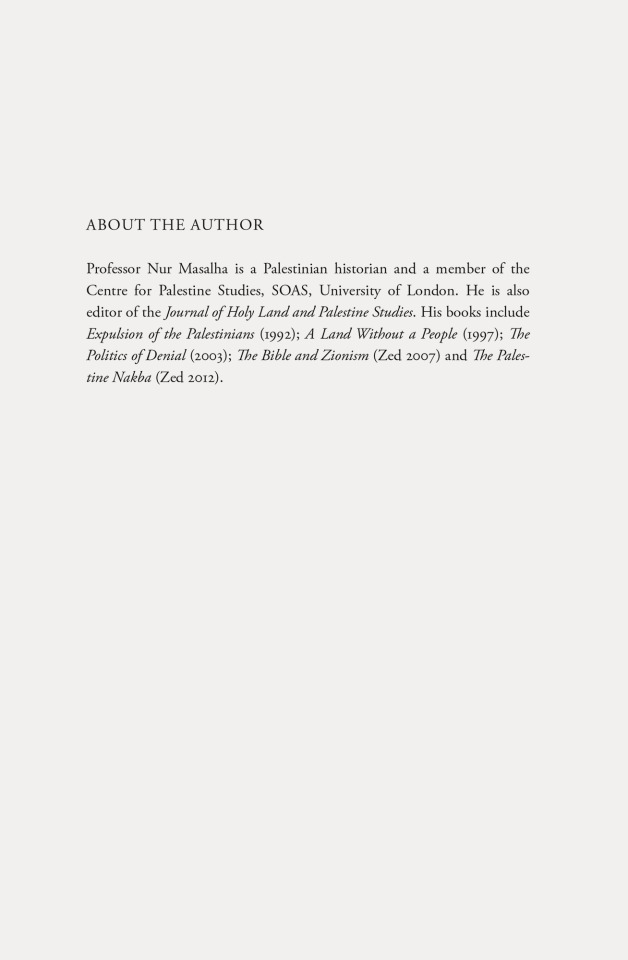
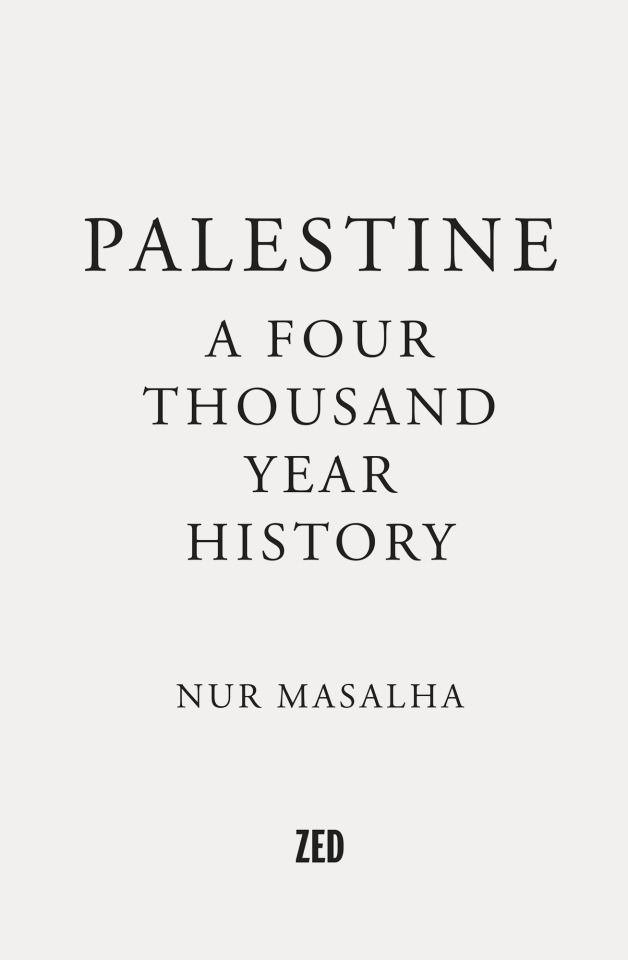
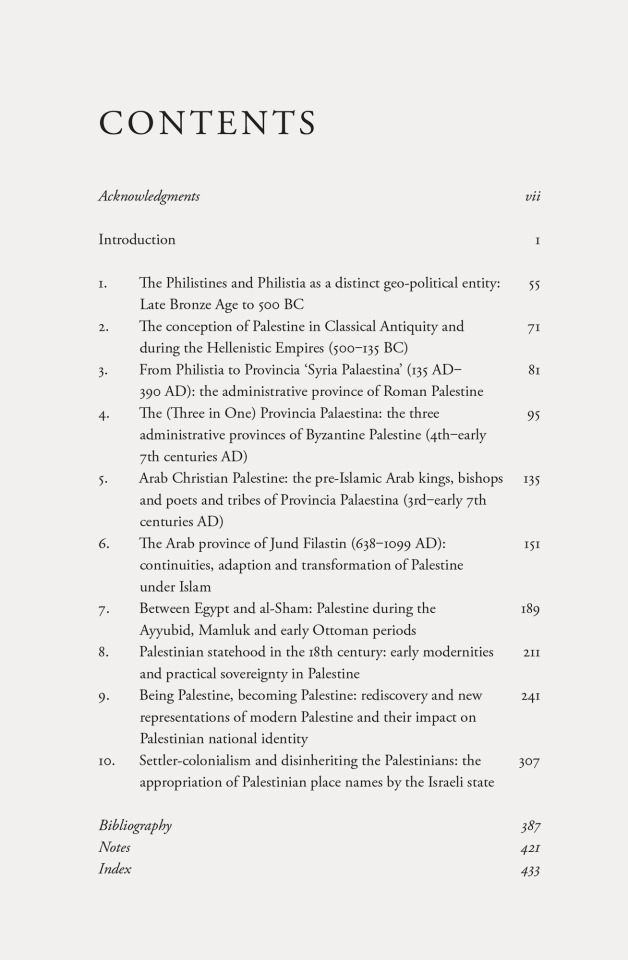
Cover Design: Alice Marwick
Cover image: Mosaic map of Palestine and detail of Jerusalem [Civilisation of Palestine, 5th Century BC. ©DEA Picture Library]
#graphic design#history#historiography#book#cover#book cover#nur masalha#centre for palestine studies#alice marwick#zed books#2010s
47 notes
·
View notes
Text
From here, I shall:
Name all my loves
Create, share and champion creative portals that open up new dimensions for liberation and healing
Remind myself (again and again) to be fully present in the life of my creative process: the back alleys, the off roads, the digressions, the parallel universes, the epiphanies that we used to second guess because they seemed to appear ‘instantly’
(if only we knew, how long they’d travelled through our blood to reach us, lifted from the eternal dreams of our ancestors, ripped from the scarred hands of our molten fears and shining from the wildest, wide-eyed, wishes we’d once told: NO. if only we acknowledged that these impulses and discoveries were gifts from the most high)
Again from here, I shall:
Honour the journey over the destination or outcome
Ask, how I can further yield to the poetic? In my life. In my filmmaking practice. In my offerings?
Excavate and express from the mind body and soul of my practice and honour my truth, that all my art making is a form of prayer that asks the creator: how to live best, in the sight of their memory*?
Celebrate forward movement and momentum. Honour nature, rest, reflection, study, paths to rejuvenation and dreaming
Build my refusals, sharpen my stance, sharpen my steez and move in peace, sword by my side
Demand an end to global oppression. Free Congo Free Sudan Palestine and free everyone reading this
Reverse the spells that reduce and exploit my peoples histories, stories, customs, cultures, continuums, bodies and spirits into profit centres, aesthetics and labour intensive trend factories for blood thirsty sleep-inducing systems of colonialist expansion for the white supremacist capitalist patriarchy and their many many agents
Decolonise my spirit, learn and listen
Do all of this (the work, the practice, the dance) with a sense of humour, a touch of madness and an appreciation of the erotic
Encourage strength, movement, empathy and rhythm
Broadcast, live and direct from Babylon (somewhere inna London Town and fascist Europa)…a son of the diaspora, living in gratitude whilst longing for a home that doesn’t quite exist…one I’m now creating myself. Godwilling it will be my greatest creation asides from endlessly (re)creating myself...
Perhaps this blog is part of that making?
…
…..
……..
*I give a damn if any fan recalls my legacy, I'm trying to live life in the sight of GOD's memory. Yasin Bey, Black Star, “Thieves in the Night”
7 notes
·
View notes
Text
We, the undersigned organizations, write to express our urgent concern regarding dire and escalating violence in Israel and Occupied Palestinian Territory, which continues to result in significant human suffering and loss of civilian life.
We condemn all violence against civilians by Hamas and the Israeli military. In this critical moment, we believe it is imperative that U.S. policymakers take measures to immediately de-escalate the violence to prevent the further loss of civilian life. We urge Congress and the Administration to:
Publicly call for a ceasefire to prevent the further loss of life;
Prioritize the protection of all civilians, including by urgently securing the entrance of humanitarian aid into Gaza and working to secure the release of hostages; and
Urge all parties to fully respect international humanitarian law.
We implore Congress and the Administration to abstain from rhetoric that exacerbates violence and to unequivocally condemn all violations of international law. Over the last several days, the Israeli government has cut all food, fuel, and humanitarian assistance to the Gaza Strip. On October 12, Israel issued an evacuation order for the entire northern Gaza Strip, telling residents to evacuate south of Wadi Gaza. This amounts to approximately 1.1 million people. The U.N. is calling for this order to be rescinded, warning it will have “devastating humanitarian consequences.”
We again urge Congress and the Administration to publicly call for, and help to facilitate, an immediate ceasefire to prevent the tragic loss of more innocent Palestinian and Israeli lives. Thank you for your urgent consideration.
Sincerely,
Alliance of Baptists
American Baptist Churches USA
American Friends Service Committee
American Muslims for Palestine
Americans for Justice in Palestine
Anera
Arab American Institute
Auburn Theological Seminary
Center for Civilians in Conflict
Center for Jewish Nonviolence
Center for Victims of Torture
Church of the Brethren, Office of Peacebuilding and Policy
Churches for Middle East Peace
Common Defense
Council on American-Islamic Relations
Demand Progress
Democracy for the Arab World Now
The Episcopal Church
Evangelical Lutheran Church in America
Fellowship of Reconciliation
Freedom Forward
Friends Committee on National Legislation
Global Centre for the Responsibility to Protect
Grassroots International
Historians for Peace and Democracy
If Not Now
Institute for Policy Studies New Internationalism Project
International Civil Society Action Network (ICAN)
Israel/Palestine Mission Network of the Presbyterian Church (U.S.A.)
Jewish Voice for Peace Action
Just Foreign Policy
Justice Democrats
Lott Carey Baptist Foreign Mission Convention
MADRE
Maryknoll Office for Global Concerns
Mennonite Central Committee U.S.
Minnesota Peace Project
MPower Change Action Fund
National Council of Churches
National Iranian American Council
Neighbors for Peace
Nonviolent Peaceforce
PAX
Pax Christi USA
PC(USA) Office of Public Witness
Peace Action
Project on Middle East Democracy
Quincy Institute for Responsible Statecraft
Quixote Center
ReThinking Foreign Policy
Robert F. Kennedy Human Rights
RootsAction
September 11th Families for Peaceful Tomorrows
Sojourners
The Duty Legacy
The Unitarian Universalist Association
The United Methodist Church - General Board of Church and Society
The Zomia Center
United Church of Christ
United for Peace and Justice
UNRWA USA
Women for Weapons Trade Transparency
Working Families Party
World BEYOND War
Yemen Freedom Council
Yemen Relief and Reconstruction Foundation
Yemeni Alliance Committee
5 notes
·
View notes
Text
Purim, 1945: More from the U.K.
From The Jewish Chronicle (London) for March 2nd:
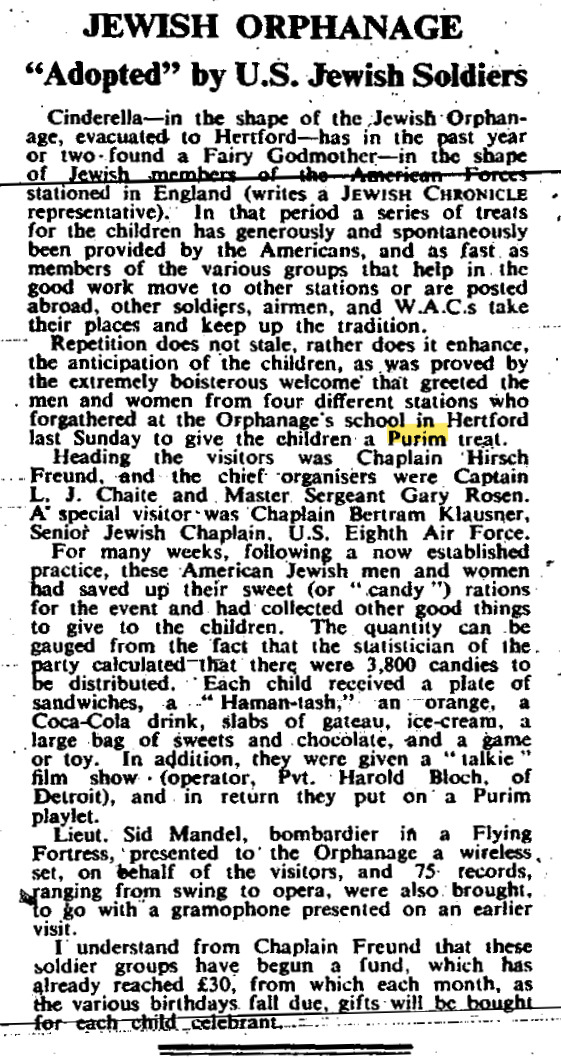
Captain Hirsch E. L. Freund, a Reform rabbi, was born in Poland in 1898 — and therefore probably came from an Orthodox background. He came to the U.S. in 1911 and, like many Reform rabbis of his generation and origin, graduated from the University of Cincinnati before receiving his ordination from Hebrew Union College in 1928. He seems to have been somewhat peripatetic throughout his rabbinate: he served at least two different congregations — in South Carolina and Iowa; now there's a contrast! — before his induction in October 1943. He was discharged in 1946 and towards the end of that year he became Educational Consultant to the Civic Service Department of the Anti-Defamation League of B'nai B'rith, and later worked at various times for the Veterans' Administration, the Synagogue Council of America, and I don't know where else. I haven't been able to find an obituary for him.
I wrote about Rabbi Klausner here.
One week later, The JC published the following:

There's quite a bit to unpack here, even leaving politics aside.
The Rev. J. Halpern pointed out that that was the first time in the history of the London Talmud Torahs that the pupils had sung in Hebrew on the platform in the Sephardi pronunciation.
When Eliezer Ben-Yehuda, the father of modern Hebrew (no matter who says different) arrived in Ottoman Palestine from his native Belarus in 1881, he discovered that Jews there pronounced the language differently than what he had been taught. He concluded that since they were geographically closer to the source, their pronunciation must be correct. As a result, Sephardi pronunciation (sfardit) is what is now standard in Israel. It's what I was taught, but it's never completely caught on here in North America: you'll hear a tug-of-war over phonemes going on at almost any synagogue service. If I were a betting woman I'd be willing to make a small wager that the same is true in the U.K.
Major Max Jonah Routtenberg (1909-1987) was born in Montreal and came to the U.S. in 1927, apparently for the specific purpose of studying at New York University, from which he graduated in 1931. He received his ordination just a year later from the Jewish Theological Seminary of America, New York (which marks him as Conservative). Immediately prior to his induction in November 1942 he had been serving Kesher Zion Synagogue in Reading, Pennsylvania. I don't know when he was discharged, but afterwards he became an administrator at J.T.S. and then, from 1954 until he retired in 1972, served Temple B'nai Sholom, in Rockville Centre, New York.
The choir, formed from the Halevy Choral Society, was under the direction of Mr. S. Alman.
Wow. Samuel Alman (1877-1947) is one of the most important British composers of synagogue music.
And Rabbi Klausner was everywhere, as you can see!
#world war ii#u.k. home front#u.s. armed forces in the u.k.#jewish experience#purim 5705#purim 5784#is today
3 notes
·
View notes
Note
Not here to attack or anything I just like your take on Israel and I would like to add that people (or most of them i hope) aren’t against the jewish existence anywhere, they’re just against the state of Israel and its practices and policies. Source: am from a neighbouring country never met someone against jewish people.
Hi! Sorry I didn't seem to see this ask sooner. Unfortunately, I've run into a lot of people who invoke antisemitic tropes in their "activism" for Palestine and Palestinians here in Canada, although I'm sure it's easier for Jews to identify antisemitic dogwhistles than it is for non-Jewish people :(* Even if someone is against the Israeli government, its actions, or its policies (which isn't inherently antisemitic at all), their criticism can easily veer into antisemitism if they use antisemitic tropes in what would otherwise be valid criticism. I'm not Israeli myself, but in my experience, Israelis are honestly one of the groups MOST critical of Israel and the Israeli government. I obviously don't have any perfect solution to the conflict since I'm just a random Jew at a Canadian university studying the Hispanic Caribbean (aka a field completely unrelated to the region or its history), but I definitely think that centring Palestinian and Israeli voices is something that's been lacking in Western activism related to I/P and is something that needs to improve a lot. Even 3rd+ generation Palestinians and Jews in Canada or the US just aren't going to have the same level of knowledge, involvement, or stakes in I/P as people who actually live in the region, so centring either diaspora isn't necessarily great either (although it is slightly better than focusing on the takes of non-Palestinian goyim).
I'm personally hesitant to label myself as either Zionist or anti-Zionist because both terms cover such a wide range of stances (you can have two people with the exact same political stance on I/P where one considers themselves a Zionist and the other an anti-Zionist), so it's not helpful terminology at all imo. Basically, in the simplest terms, I'm just pro-peace, which is the bare minimum at this point. Israelis, Palestinians, and Jews all live in Israel-Palestine, regardless of what language people use to describe them, and none of them are going anywhere.
*I will say that a lot of "pro-Palestine activism" has just been anti-Israel and heavily performative in a way that doesn't actually prioritise the wellbeing of Palestinians and just exists to make the person doing it look good (for example, the whole "being on the right/wrong side of history" rhetoric). Also a lot of the stuff I've run into hasn't even been dogwhistles, it's loud and proud antisemitism. Most of my Jewish mutuals and accounts I follow, including ones who identify as anti-zionist or non-zionist, have received multiple death threats and suicide baiting asks and messages
#peace means compromise#this isn't an all-or-nothing situation#(and it shouldn't be)#i support palestinian self-determination but not at the expense of jewish self-determination#and vice versa#asks
2 notes
·
View notes
Text
Broadcast journalists are sometimes accused of bias against Israel.
Such claims have been made, among others, by the pro-Israel media monitoring group BBC Watch and the right-of-centre press. More recently, the BBC was criticised by the Board of Deputies of British Jews and a former BBC executive for not referring to Hamas as “terrorists”.
These accusations tend to rely on highlighting a single issue or event that is then extensively analysed and presented as symptomatic of a widespread problem. However, to properly assess whether coverage is balanced, what is needed is systematic academic research that relies on tested social science methods.
In this article, we will review research carried out over more than 20 years – from the second intifada at the turn of the millennium to the current war in Gaza – and show what it tells us about whose perspectives are favoured in broadcast news. What this review will reveal is very striking continuities and patterns in broadcast reporting stretching back over decades. Such patterns are also seen in current reporting of the Gaza war, which we show in new research published for the first time here.
Most studies carried out prior to the current fighting in Gaza – including research commissioned by the BBC itself – have repeatedly found that it is the Israeli perspective that is favoured. This judgement is formed on the most basic criteria, such as the number of appearances of spokespeople, the use of press statements and the legitimacy accorded to Israeli rather than Palestinian perspectives.
We conducted a series of studies between 2000 and 2010 that showed the impact of such coverage on public understanding of the history and origins of the conflict; the motives of those involved; and who is publicly perceived as having initiated violence and sustained the most casualties.
To do this we combined two research methodologies. First, we did a thematic analysis of transcribed television news broadcasts, examining which explanations and ways of understanding are foregrounded in broadcast news bulletins and which are absent. We chose television news because at the time research showed that this medium was the main source of world news for 79% of the UK population. Second, we used surveys and audience groups to explore how such coverage influenced public knowledge and understanding of the conflict.
During the second intifada (the Palestinian uprising of 2000 to 2005) we took a sample of 3,500 lines of news text covering the first three weeks of the uprising on the mass audience bulletins (lunchtime, early evening and late news) on BBC1 and ITV1.
Only 17 of these, across both channels, mentioned any aspect of the history of the conflict. For the Palestinians, the loss of their homes and land when Israel was created, and the military occupation under which they have lived since 1967, are fundamental. Yet we found that explanations of the conflict given in news accounts tended to reduce it simply to a “cycle of violence” that started when one side attacked and the other “retaliated”. In this initial sample we found that approximately three times as much text (50 lines) was devoted to explanations of the conflict as a “self-perpetuating” cycle of violence, as was given to discussion of its origins or history.
Even in this, we found that the attribution of what was “triggering” the violence was not equal between the two sides. There was a much greater emphasis on Israeli “retaliation”. In one sample – taken between between October and December 2001 – we found that Israelis were described as “responding” or “retaliating” to what had been done to them about six times as often as the Palestinians. This created a framework where Palestinians were presented as initiating the violence and Israelis simply as reacting to it.
In 2023, the United Nations Secretary-General António Guterres reaffirmed the centrality of the conflict’s backstory when he stated that the 7 October attacks “did not happen in a vacuum” and were related to the history of the occupation: “The Palestinian people have been subjected to 56 years of suffocating occupation,” he said. “They have seen their lands steadily devoured by settlements and plagued by violence, their economy stifled and their homes demolished. Their hopes for a political solution to their plight have been vanishing.”
Yet the BBC repeatedly gives reports of events without such context. For instance, on 23 November BBC Online reported that: “The conflict began when Gaza-based gunmen from Hamas attacked southern Israel on 7 October, killing about 1,200 people and taking about 240 others hostage.”
The BBC’s coverage locates the origin of the conflict in the recent actions of Hamas – but Palestinians see themselves as resisting the actions of Israel stretching back decades.
In our earlier studies, which covered nearly five months of BBC One and ITV1 mass audience bulletins, we also found that, in the absence of context and history, BBC journalists would report the Palestinian “side” in terms of the suffering caused by the fighting. But the Palestinian perspective in terms of the reasons for the conflict was absent. The Israeli rationale, on the other hand, was often foregrounded in news reports.
When we tested the possible effects of this on audience members – by asking why participants in our audience groups thought the two sides were fighting and how the conflict could be resolved – we found these patterns in reporting appeared to lead some to conclude that it was “very sad” for the Palestinians but that the Israelis were “retaliating” and the situation could be resolved if the attacks on Israel stopped.
Another key finding from these studies was that Israeli casualties were given proportionally more coverage than Palestinian ones, and the language used to describe Israeli deaths was markedly different. Words such as “atrocity”, “murder”, “lynch-mob” and “barbarically killed” were used by journalists to describe the deaths of Israeli soldiers, but not those of Palestinians.
Such patterns are also evident in current reporting. We examined four weeks (7 October to 4 November) of BBC One daytime coverage of the 2023 Gaza war using the database TV Eyes to identify which terms were used by journalists themselves (not in direct or reported statements) to describe Israeli and Palestinian deaths.
We found that “murder”, “murderous”, “mass murder”, “brutal murder” and “merciless murder” were used a total of 52 times by journalists to refer to Israelis’ deaths but never in relation to Palestinian deaths. The same pattern could been seen in relation to “massacre”, “brutal massacre” and “horrific massacre” (35 times for Israeli deaths, not once for Palestinian deaths); “atrocity”, “horrific atrocity” and “appalling atrocity” (22 times for Israeli deaths, once for Palestinian deaths); and “slaughter” (five times for Israeli deaths, not once for Palestinian deaths).
But the issue goes beyond these differences. The Palestinian perspective is effectively absent from the coverage, in how they understand the reasons for the conflict and the nature of the occupation under which they are living.
One senior BBC correspondent commented to us in 2002 that what was missing was the view that the Palestinians saw themselves as engaged in a decades-long struggle of national liberation “in which a population is trying to throw off an occupying force”. Our research has found that this perspective, if it occurs at all, is not developed as a theme by journalists or related routinely to events, and has nothing like the status given to the Israeli perspective which stresses that Israel is subject to terrorist attacks motivated by Islamic extremism and antisemitism.
In contrast, Palestinians regard the Gaza attack by Israel in 2023 as part of the war of occupation. They see it as genocidal in the level of civilian casualties and damage to residential areas, infrastructure and health facilities, well beyond defined military targets. They received support for this view from the director of the New York office of the UN High Commissioner for human rights, Craig Mokhiber, who resigned from his post, terming the attack a “textbook case of genocide”. An online search of BBC coverage shows no trace of this resignation or its cause although it was widely covered by other sources.
But legitimacy is given by journalists to the perspective of Israel, and the conflict can be seen and described through this. So, for example, during the second intifada in 2002, Israeli soldiers were described as being “in good spirits” and their leaders “determined to press on with the offensive”. Palestinians see themselves as subjected to military control and a system of apartheid. But Palestinian fighters were not described on the news at this time as being, for example, determined to overthrow this system and the occupation of their land. In this conflict, the perspective of only one side is given legitimacy.
In the current Gaza war, when a former Israeli general was interviewed for BBC Online, he was described as “straight-talking” when he said that innocent civilians would have to be killed when Israel “crushed” its “enemy” and that “we need to be tough”. It is inconceivable that any Palestinian group would be given space to describe the need to kill Israeli civilians – let alone be described as “straight-talking” when doing so.
We did not write this article or engage in research to justify the use of violence by anyone in any circumstances. But we write in the knowledge that peace can only come when realistic negotiations take place between people who are actually fighting. For peace to have any chance, the reasons for conflict must be understood and seriously addressed.
The BBC must support international law. If claims of genocide are being made then these must be named and investigated and the actions of politicians held to account. For the BBC and other western media to simply repeat the propaganda of one side while denying legitimacy to the other will in the long run do nothing for the cause of peace but will simply hold back the public and political will needed to press for realistic negotiations to end the conflict.
4 notes
·
View notes